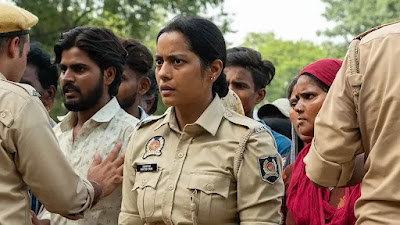Santosh isn’t just a film — it’s a mirror to the harsh truths of our society. It quietly but powerfully shows how caste, power, and gender work in everyday life, not just in villages but even in so-called modern India.
It starts small — a widow gets her husband’s police job. But step by step, we see how this system slowly corrupts her. Power never comes loudly — it seeps in quietly. At first, it feels like survival. Then it becomes habit. And soon, even good people start justifying wrongs, without even knowing they have crossed the line.
One strong line hit me hard : “Some we can't touch, some are untouchables.” That one dialogue says everything about our society.
This film doesn't shout. It shows. In the silence, in the cramped police stations, in how Dalit voices go unheard, and how women in uniform are still controlled by men. Even when we want to raise our voice, we end up sitting in a corner — quietly watching the hatred grow.
Sadly, today’s narrative is becoming more dangerous — in many places, it’s almost default to blame Muslims as culprits, without a second thought. That ground has already been created. The only way forward is understanding each other, breaking the chain of hate, and moving away from the toxic influence of propaganda-driven media outlets.
The caste system is not gone. It's digital now, urban now. But it’s still the same poison — hidden in polite conversations, police files, and silence.
And that’s why Santosh is important. It makes you uncomfortable — not with noise, but with truth.

Comments
Post a Comment